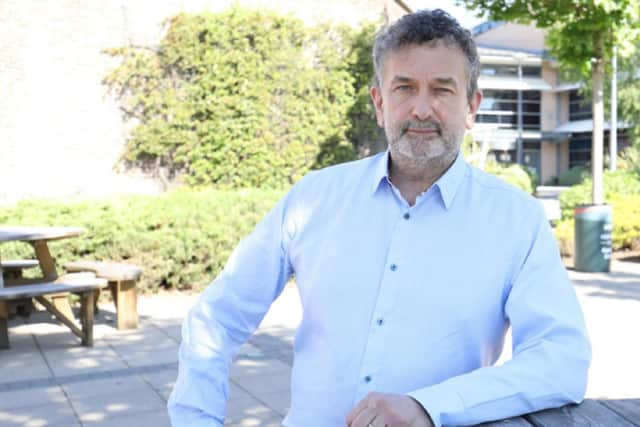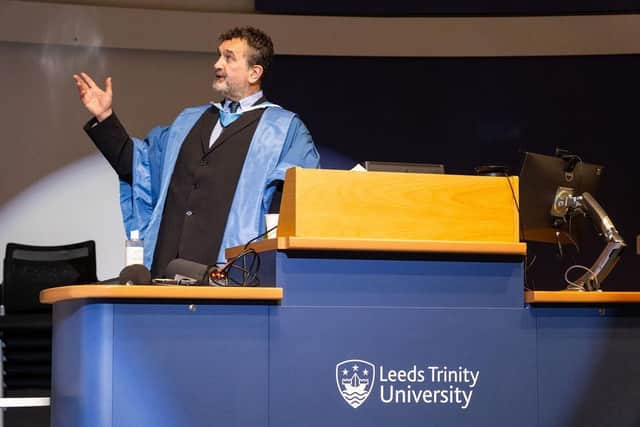Meet the world's first professor of addiction recovery based in Leeds and transforming lives
It is understandable then, that he has always had a personal interest in the field of research in which he specialises. As the first Professor of Addiction Recovery in the world, the Leeds Trinity University academic looks at how and why people can turn their lives around, not only leaving addictions behind but becoming “better than well”.
“Essentially, my job is to lead British research efforts to understand who, how, when, people can overcome various addictions,” he explains of the post he took up 18 months ago. “In essence, that’s always what my work has been around.
Advertisement
Hide AdAdvertisement
Hide Ad"But Leeds Trinity has given me a platform…[The role] gives a status and a credibility to the area of work. For me, it’s really important as part of the emergence of recovery science to say this is now regarded as a legitimate area of strong, empirical enquiry. This is proper research science.”


Prof Best’s inaugural professorial lecture at Leeds Trinity last month focused on hope and collective working, exploring the role of peers and communities in recovery and rehabilitation.
“When somebody first goes through medical treatment for addiction, they’re highly vulnerable for a period of typically up to about five years," Prof Best says. “Their likelihood of relapse is more than 50 per cent in their first year.
"In a relatively recent European study of recovery pathways, of our sample of people who made it to five years or more [of sobriety], only 1.5 per cent of them relapsed...The practice of my work is essentially saying how can we maximise the likelihood of people sustaining their recovery?
Advertisement
Hide AdAdvertisement
Hide Ad"The basic things are jobs, friends and houses - somewhere to live, someone to love, something to do. Those are the fundamental building blocks of recovery.


"My work is about counting where people are on that pathway and then trying to find the appropriate methods and interventions to support that recovery journey.”
Since taking up his world-first position, Prof Best has been influential in developing the inclusive recovery cities scheme, a project looking at how community opportunities such as access to work, housing, treatment and recreational activities – and how the reduction of stigma – can help people to sustain recovery.
Leeds, Sheffield and Middlesbrough are among places already involved, focusing on recovery as “co-production”. The aim is to make recovery visible in communities and to celebrate it by organising activities and bringing people together.
Advertisement
Hide AdAdvertisement
Hide Ad“People can only go so far on their own in their recovery efforts,” says Prof Best, who grew up in Lanarkshire, Scotland. “There comes a point where society can block them or facilitate them. Things like we won’t employ somebody with an addiction history or they can’t live in certain housing, all those things are structural societal blockages.
“Inclusive recovery cities is about how people can be supported to access resources in their communities and how we can challenge systemic barriers to change. It really has been a phenomenal thing.
"We know that if people can make it to that five year mark of continuous sobriety, typically their contribution to society is big. They volunteer, they work, they pay taxes, they are stably housed.
"There are massive contributions to all domains of life if we can get people through that initial troubled people. It’s not simple or straightforward but really a lot of my work is about championing and supporting that sense of redemption and allowing people the chance to flourish.”
Advertisement
Hide AdAdvertisement
Hide AdProf Best is already the author or editor of eight books on addiction recovery and has published more than 240 peer-reviewed journal papers.
When it officially launches in the new year, he will also be director in the Centre for Addiction Recovery Research at Leeds Trinity University.
He has collated 3,500 stories from people in recovery around the world. “It frustrates me hugely when people say to me, people don’t recover, it’s a lifelong, chronic relapsing condition,” he reflects. “I have thousands of testimonies that say otherwise, that people do turn their lives around.”
